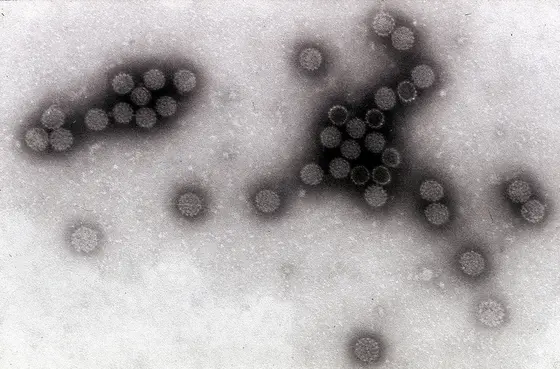Cancer of the oropharynx has become increasingly common: In the United States alone, the number of newly diagnosed cases has tripled over the past three decades. About 70 percent of these tumors are caused by infection with human papillomavirus (HPV) type 16.
Tim Waterboer and his colleagues at the German Cancer Research Center (Deutsches Krebsforschungszentrum, DKFZ) in Heidelberg have now revealed that an antibody test that they developed can detect early if a person has a very high risk of developing an HPV-associated cancer of the oropharynx. The DKFZ researchers collaborated in this project with colleagues from the International Agency for Research on Cancer (IARC) and the U.S. National Cancer Institute.
The immune system responds to an infection with HPV by producing antibodies against components of the virus. HPV protein E6 is produced by chronically infected cells and plays an important role in the development of cancer. Therefore, antibodies against E6 are regarded as very valuable indicators.
In the new study, the scientists investigated blood samples from the U.S. PLCO study. For this early cancer detection study, approximately 150 000 healthy participants were recruited between 1993 and 2001 and cancers that they developed in the period under investigation were documented. The DKFZ researchers studied 198 blood samples from patients with tumors of the oropharynx. The samples had been taken when the participants entered the study, i.e., long before the onset of the disease. The control samples were from 924 PLCO participants without cancer diagnosis.
In 42.3 percent of the patients with oropharyngeal cancer, the DKFZ researchers were able to detect antibodies against HPV16 E6 in their blood samples. “This pretty much corresponds to the percentage of HPV-related cases of oropharyngeal cancer that we expected to find for that time in the American population,“ Tim Waterboer said. By comparison, only 0.5 percent of individuals in the control group tested positive to HPV16 E6.
Tumor tissue of some study patients was also available for study besides the blood samples. Based on the activity of viral genes in the tissue, the researchers were able to identify the tumors that had been caused by HPV. They found that only those patients tested positive to the antibodies whose cancer was in fact associated with HPV16.
If the test result for HPV16 E6 antibodies is positive once, it remains stable over many years, discovered the researchers in study participants from whom blood samples had been obtained repeatedly over a long time. In some cases, the blood samples had been taken up to 13 years prior to cancer diagnosis. “This means that a single blood sample test taken at any point of time might be sufficient for assessing a person's risk for developing cancer of the oropharynx within the next 10 years,“ said Waterboer.
Nevertheless, detection of HPV16-E6 antibodies is –at least for now – not a suitable method for early cancer detection in larger population groups. “The occurrence of new cases of oropharyngeal cancer is rather low at about five cases per 100 000 inhabitants,“ said Waterboer, who is the study head. “That means that although the test is highly specific, very many healthy people would receive false positive results. However, in certain high-risk groups, up to ten times more people can develop the disease. HPV16 E6 antibody detection is the first ever easy-to-analyze biomarker that enables us to narrow down the circle of individuals who are at an extremely high risk of developing the cancer.“ The DKFZ virologists are currently examining possibilities of making the biomarker applicable in the clinic.
However, the test for antibodies against HPV16 E6 is not suitable for assessing the risk for cervical cancer and other HPV-associated cancers in genital areas. As opposed to cancer of the oropharynx, the revealing antibodies do not occur here before the cancer becomes clinically detectable.
Aimée R. Kreimer, Mattias Johansson, Elizabeth Yanik, Hormuzd A. Katki, David P. Check, Krystle A. Lang Kuhs, Martina Willhauck-Fleckenstein, Dana Holzinger, Allan Hildesheim, Ruth Pfeiffer, Craig Williams, Neal D. Freedman, Wen-Yi Huang, Mark P. Purdue, Angelika Michel, Michael Pawlita, Paul Brennan, Tim Waterboer: Kinetics of the human papillomavirus type 16 E6 antibody response prior to oropharyngeal cancer
Journal of the National Cancer Institute 2017, DOI: 10.1093/jnci/djx005
